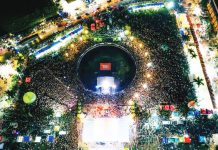
IT WAS A tough and hard experience for 10 Filipino victims of human trafficking in Myanmar scam centers, from where they were lured with fake offers of high-paying jobs and forced to work without pay. They suffered threats and abuse and became desperate to get home.
They recently contacted the Preda Foundation, a child protection and anti-trafficking organization in Olongapo City. Four of them have escaped from the scam center.
Preda is in contact with the Philippine Department of Migrant Workers (DMW) and lawyer Don Albert Philippe C. Pangcog, the labor attaché at the Migrant Workers Office in Bangkok who has been helping many Filipinos escape the scam centers in Myanmar and those in the Thai processing centers to return to the Philippines.
After they escaped, the 10 Filipinos were advised by Col. Dominador Matalang at the Bangkok Embassy to cross from Myanmar to Thailand, and four did so. Thai authorities have ruled that they are not trafficking victims, as they had not been beaten. The Philippine Embassy will do all it can to pay the fines levied by the Thai authorities and free them from custody. That is 20,000 baht for each person, which equals to P34,062.96. The embassy has already booked flights for them.
Pangcog will help them as he has helped recently the return of 16 Filipinos from the same scam centers as announced last Feb. 18, 2025. They, too, had been recruited by human traffickers online and lured with promises of high-paying professional jobs in Thailand but ended up detained in forced labor centers in Myanmar. Social media is filled with fake offers from criminal recruiters posing as legitimate employers but are, in fact, human traffickers.
Like other victims of human trafficking, they were instructed by their would-be “employers” through Facebook and mobile phone to get tourist visas when they landed in Thailand. They were picked up by a van after they exited the airport and driven for many hours to the north of Thailand. They became agitated and worried when they were led to a boat and crossed the river into Myanmar.
There, they were confined in a scam center building where many other English-speaking people from different countries were forced to work at a computer or mobile phone, scamming rich people in Western countries.
The trafficking victims had a quota to earn money for the criminal syndicate that operated the center. They received threats if they missed their quota. They were forced to work for up to 20 hours a day setting up so-called romantic relationships with rich foreigners in Western countries. (To be continued)/PN







